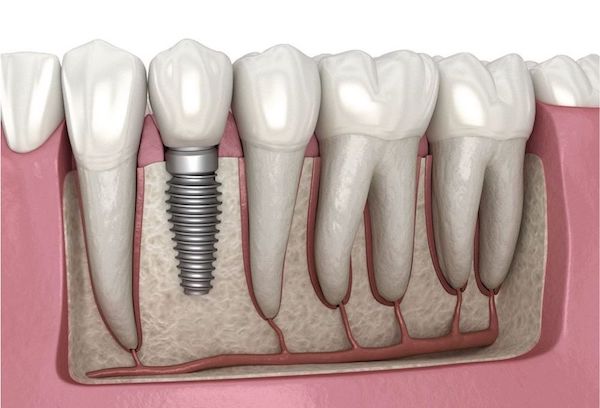
Tooth implant is the most modern method of replacing missing tooth or multiple teeth. Gaps formed by missing teeth can cause bone loss, periodontal disease, and infections that may affect a person’s ability to eat or speak. It is very important to fill in any gaps as soon as possible to prevent the adjacent and opposing teeth from shifting positions or causing further damage. No one likes the idea that his or her smile will be incomplete. In addition, we all rely on every one of our teeth for eating, speaking, smiling, and looking beautiful.
At Dental Implants Los Angeles, Dr. Nik will place a titanium or ceramic implant screw into the jawbone where the original tooth used to be. This Implant screw acts as the tooth roots and keeps the bone and soft tissues stabilized and stimulated.
In additional to their many aesthetic advantages, tooth implants offer a number of benefits for your oral health. They allow for the replacement of one or more teeth without affecting the adjacent teeth. Additionally, teeth implants can support a bridge and eliminate the need for removable partial dentures.
Other options to replace missing teeth include dental bridges, partials, and dentures which act as a restorative and cosmetic dental procedure.
We offer best dental implant prices in Los Angeles!

After the initial placement, it’s best to let the implant screw fuse to the surrounding bone for about three to six months, and then finish restoring the dental implant with an implant crown.
The result is natural looking that can potentially last a lifetime if proper oral hygiene is maintained. It also can withstand the normal chewing actions of natural teeth; once the tooth implant fuses to the jawbone, it stays in firm and you can eat anything your heart desires, no restrictions!
For the simple solution to missing teeth, schedule your Complimentary Dental Exam at Los Angeles Dental Implant, where you will find the best dental implant prices.
There are a multiple sizes and shapes of teeth implants that can be customized and tailored to your specific needs and circumstances. Cosmetic dental Implants are the ideal option to replace missing teeth and they are an alternative option to dentures and partial plates as well. No matter your circumstance, implants are first and foremost a way to help restore your natural smile and confidence as easily and effectively as possible.
The Process – To ensure that you are a good candidate for dental implants, Dr. Nik performs a very thorough examination to evaluate your bone level and density, and asks multiple questions about your medical history. Sometimes a person does not have enough bone to hold a tooth implant properly and may require extra steps such as bone graft or bone augmentation prior to placement.
General rule, if you are healthy enough to undergo a tooth extraction, then you will most likely be able to perform cosmetic dental implants teeth replacement procedure.
What Are You Waiting For...
Make an Appoinment
Schedule your consultation today and take the first step towards personalized care. Our easy-to-use online appointment system ensures you get the attention you need at your convenience.
What our client say about us!
“Dr Nik is a highly skilled cosmetic dentist in Los Angeles. I recently had a smile makeover, which included Invisalign, teeth whitening, and porcelain veneers. The process was seamless, and the results are stunning. Dr Nik's expertise and attention to detail are unmatched, and I couldn't be happier with my new smile. I highly recommend Dr Nik to anyone looking for a comprehensive cosmetic dental procedure.”
“I recently had a teeth whitening procedure with Dr Nik, a cosmetic dentist in Los Angeles. The experience was phenomenal. Dr Nik and his staff were extremely friendly, and they made me feel comfortable throughout the procedure. The results were amazing. My teeth are now several shades whiter, and my smile looks great. I highly recommend Dr Nik for his professionalism, expertise, and quality of work.”
“I had a dental implant procedure with Dr Nik, a cosmetic dentist in Los Angeles, and I am thrilled with the results. Dr Nik was very thorough in explaining the procedure and addressing my concerns. The implant was a perfect match for my natural teeth, and the process was seamless. Dr Nik's expertise and attention to detail are commendable, and I highly recommend him for any cosmetic dental needs.”
“Dr Nik is an excellent cosmetic dentist in Los Angeles. I had a porcelain veneer placed on my front tooth, and it looks amazing. Dr Nik was very meticulous and took the time to ensure that the veneer matched the shade and shape of my natural teeth. The procedure was painless, and I am very happy with the results. I highly recommend Dr Nik for his attention to detail, expertise, and quality of work.”
“Dr Nik is an exceptional cosmetic dentist in Los Angeles. From the moment I walked into his office, Dr Nik listened to all my concerns and answered all my questions. He was very thorough in his examination and provided me with different options to improve my smile. The results were outstanding, and I couldn't be happier. I highly recommend Dr Nik to anyone looking for cosmetic dental services.”
“Dr Nik is a fantastic cosmetic dentist in Los Angeles. I had a bonding procedure done on my teeth, and the results were fantastic. Dr Nik was very gentle and took the time to ensure that my teeth looked natural and symmetrical. The process was painless, and the results were outstanding. I highly recommend everyone to visit Dr Nik for his professionalism, expertise, and quality of work in this field.”
How much is cost of implants for teeth?
We are the most affordable dental implant specialists in Los Angeles. The cost of implants for teeth depends on several factors including the material and the number of implants required. In addition other factors play a big role when it comes to the reasonable dental implants cost in Los Angeles such as Bone Graft/Ridge Augmentation, Sinus Lift, and Sinus Elevation.
At your Complimentary Dental Exam, Los Angeles cosmetic dentist, Dr. Nik will evaluate your smile and be able to give you a more accurate estimate of the best dental implant prices. In order to make sure that your procedure fits into your budget, we offer a variety of financing options. We will review these with you in detail at your initial consultation appointment.
What Are You Waiting For...
MAKE AN APPOINTMENT
RECENT BLOG POSTS
- Blog Post 1
- Blog Post 2
- Blog Post 3
- Blog Post 4
- Blog Post 5
- Blog Post 6
- Blog Post 7
- Blog Post 8
- Blog Post 9
- Blog Post 10
Copyright © 2023 LA Dental Experts
